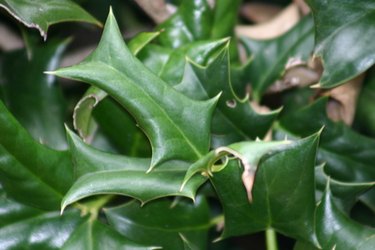
Holly plants have become classic symbols of the winter holiday season in America, with their dark green, pointy leaves and red berries. Holly bushes are generally very hardy plants with very few problems. One of the few conditions associated with holly plants is holly leaf spot disease, which causes discolored lesions to appear on the plant's leaves.
Descriptions
Video of the Day
Holly leaf spot, also known as tar spot, is characterized by small, yellow spots that appear on leaves throughout the summer, according to the Tree Help website. As the disease progresses, spots grow and turn reddish brown. Eventually the spots turn black with a tar-like appearance.
Video of the Day
Causes
Holly leaf spot is caused by a several different fungi, according to the University of Massachusetts. Some of the fungi types associated with holly leaf spot include Phacidium curtisii, Coniothyrium ilicinum and Phytophthora ilicis.
Long Term Damage
The University of Massachusetts states that holly leaf spot will cause no lasting damage to a holly plant. As the disease progresses, holly leaves may turn completely brown and fall off. However, the bush typically lives and will grow new leaves.
Prevention
There are steps gardeners can take to prevent fungus from infecting holly bushes and causing holly leaf spot. When spots first appear, treat the holly bush with a fungicide, recommends the Gardening Know How website. It is important to prevent the fungus from returning because repeated infections can cause the bush to die. Avoid composting with infected leaves, which causes the plants to become infected again.
Proper Care
The best course of action is to grow healthy holly plants, which are less likely to become infected with leaf spot fungi. The University of Massachusetts suggests providing holly plants with proper fertilization, monitoring pH levels in the soil, mulching garden beds and providing proper irrigation during dry seasons. Pruning the plants promotes sunlight penetration and air circulation.